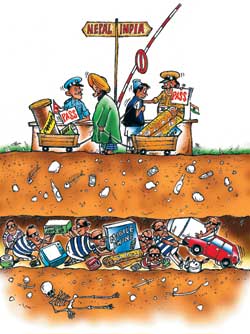 As King Gyanendra prepares to begin his unofficial visit to India, there is speculation among political pundits of behind-the-scenes meetings with Indian government officials on deadlocked bilateral issues. In the past six weeks, the Nepal-India negotiations on both transportation and power did not reach any consensus. And alleged Indian support to the Maoists is not a feverish conspiracy, if the Beed is to infer anything from Donald Camp's recent speech (Nepali Times, #135). Of late even the international press has been drawing transboundary connections between the Maoist movements in Nepal and India.
As King Gyanendra prepares to begin his unofficial visit to India, there is speculation among political pundits of behind-the-scenes meetings with Indian government officials on deadlocked bilateral issues. In the past six weeks, the Nepal-India negotiations on both transportation and power did not reach any consensus. And alleged Indian support to the Maoists is not a feverish conspiracy, if the Beed is to infer anything from Donald Camp's recent speech (Nepali Times, #135). Of late even the international press has been drawing transboundary connections between the Maoist movements in Nepal and India. The Nepali economy cannot be isolated from India and the same holds true for politics. Despite this dependence-or perhaps because of it-Nepalis have never been able to look at common issues with India holistically. A preferential treaty and a pegged exchange rate not withstanding, we have never thought of creating a strong India-focused policy body or a division to coordinate the ministries.
Perhaps we should look to Bhutan for a little inspiration. In the past decade they benefitted by being pragmatic about 'Big Brother'. Nepal continues to compartmentalise foreign policy with its neighbours. The issue of Bhutanese refugees in Nepal is dealt in isolation from India building dams on the border and Indian restrictions on Nepali exports. Bhutan played its card cleverly, binding India into silence on the refugee problem with the hydropower card. Or, as the Indian ambassador said in this paper last week (Nepali Times, #136) Nepal should look at India as an opportunity, rather than a threat.
Nepal needs to present a single front with all the unresolved issues-exchange rate to refugees, exports surge to hydropower, sustaining peace and customers procedures-as part of a one dialogue package. The Rastra Bank is sitting on lots of dollars received from remittances: this may be a good a time as any to review the exchange rate between our currencies.
For many Indians, Nepal is the face of the simple-minded bahadur gatekeeper. Babudom in Delhi has extrapolated this mindset further on its dealings with Nepal. On a day-to-day basis this translates into the difficulty Nepalis encounter with customs officials at various border points. If India is concerned about the anti-India sentiment and its effect on bilateral relations then perhaps it's time to do some damage control by respecting Nepal as a genuine partner. Both countries should work on exploring the positive aspects of their relationship instead of bemoaning a porous border and labour flow. And the private sector must look beyond lobbying for an additional ghee quota, or lifting tariffs on zinc oxide.
India must realise that it stands to gain more as Nepal's dominant partner. It would do well to mount a blitz of goodwill gestures and drown us in magnanimity. It must not mistakenly think that we only respect power. Nepalis will respect those who show some respect to them. The Beed believes if the Nepali economy is to thrive, then our relationship with India needs a bilateral paradigm shift. Piecemeal solutions are not the answer. And King Gyanendra's visit could pave the way towards this.
Readers can post their comments or suggestions to [email protected]



